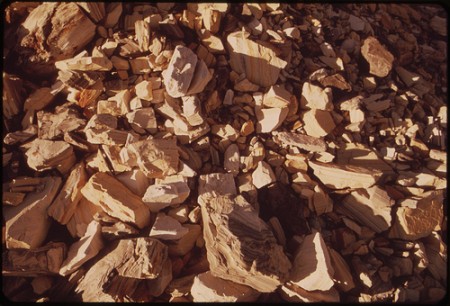
The dependency of Western economies on oil imports has shaped foreign policy considerations in the Middle East for decades and has, in turn, deeply influenced the balance of power across the region. With an estimated three quarters of total conventional oil reserves still to be found in the Middle East, one might conclude that policy alternatives will remain limited when it comes to preserving energy security. Meanwhile, the toppling of regimes in the Maghreb has yet again proven to policy makers that relying on this particular region for oil might not be the safest bet. However, Israel might be about to revolutionize the global energy sector.
In late 2010, the World Energy Council estimated that Israel had reserves of up to 4 billion barrels of oil shale. More recently, the ‘Israel Energy Initiative’ estimated that Israel is actually sitting on reserves of 250 billion barrels (to put this number in perspective, Saudi Arabia’s reserves mount up to 260 billion barrels of conventional oil). If proven, this would make Israel home to the third largest oil shale deposits after the United States and China. So how come this story is not making the headlines?
Oil shale is an organic-rich fine-grained sedimentary rock containing kerogen from which liquid hydrocarbons, called shale oil, can be produced. Unlike conventional oil, it has to be heated up to a sufficiently high temperature in order to reach a liquid state. Up until now, the extraction of oil shale has been branded as a dirty business that causes a wide range of environmental problems. Additionally, the availability of relatively cheap conventional oil has prevented the production of unconventionals from being economically viable.
New technologies, however, are being deployed to extract Israeli oil shale. The ‘In-Situ Conversion Process’ used by the Israel Energy Initiative enables the extraction of oil from the rocks without mining by separating the shale rock 300 meters underground. The company claims that this method is cheaper and circumvents major environmental concerns. Having received a license from the state to carry out geological survey drilling in 2009, the project is currently in its pilot phase, which aims to demonstrate the technological capability, the economical viability and the environmental feasibility of the enterprise. If everything runs smoothly, the company expects to produce commercial quantities by the end of this decade, with an estimated production capacity of 50’000 barrels a day.
If the project is successful, it could have a huge impact on the global oil market. Spreading the technology around the world could mean a shift in production focus from the Persian Gulf, thereby reducing dependency on authoritarian regimes. Due to Israel’s geopolitical importance, the already strong economic and political ties the country enjoys with the West are most likely to deepen even further. Nonetheless, the project still remains controversial with many environmentalist groups already raising objections. Accordingly, it still might be a long time before Israel has a dominant role in global energy matters. Indeed one might also ask if it’s not too short-sighted to build on yet another fossil fuel based resource instead of diverting investments to a more sustainable form of energy.
There is a joke in Israel that was made famous by Golda Meir, former Prime Minister of Israel, who has once been quoted saying: Let me tell you something that we Israelis have against Moses. He took us 40 years through the desert in order to bring us to the one spot in the Middle East that has no oil! If the Israel Energy Initiative turns out to be successful, the joke might soon be on the rest of the Middle East.
If you are interested in this subject, why not check out the following articles:
Israel’s Offshore Natural Gas Discoveries Enhance Its Economic and Energy Outlook
Unconventional Resources: The Shifting Geographies and Geopolitics of Energy
Strategic Survey for Israel 2011
How Verbal Threats to Close Oil Transit Chokepoints Lead to Military Conflict

